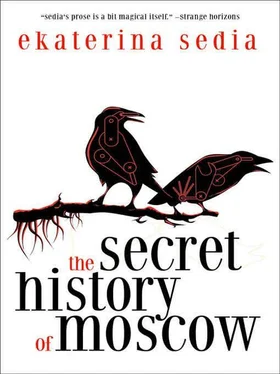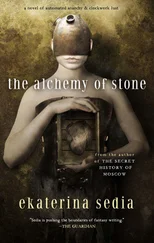Yakov stood in front of the window, in his boxers and wifebeater, looking at the poplar that didn't quite reach his sixth-story window. There was a crow's nest on top of it, and the nascent wind whipped it around; Yakov worried for the safety of two young crows in the nest. Their parents were nowhere to be seen, and the young birds squawked as the mass of twigs and branches and accidental fluff swayed back and forth with the windblown treetop. Yakov wondered if the baby birds felt nauseous. He wondered what they were still doing in the nest in September.
"Yasha!” his mother called from the kitchen. “Breakfast!"
He pulled on a pair of track pants stretched at the knees, the red stripes down the sides faded with too many washings. Too many faded red things in his life-another one of them, in the form of his mother's housecoat, dashed from the stove to the kitchen table and back, with the desperate energy of clockwork.
"Calm down, Ma,” Yakov said, and patted the old woman's shoulder. He always thought of her as old and felt startled on her birthdays, when he remembered that she was barely fifty. “It's Saturday, no need to rush."
"I was going to meet Lida to go to the cemetery,” she said. “To visit your grandparents, and the grave needs cleaning, what with all the leaves."
"It's fall. There'll be more falling tomorrow."
"Graves have to be clean,” she said, stubborn and small. “Eat."
"Don't wait on me. Just do what you have to."
She sighed. “You'll be all right?"
"Of course.” There was no need to get irritated. She always worried, a habit that wasn't going to go away. Be patient, he reminded himself. You're the grownup now, even if she doesn't realize it. “Go, do your thing. Have fun. Enjoy the graves."
Her face pinched. “The dead need to be taken care of."
He knew better than to argue. There was no point in telling her that she was the only one comforted by the endless, thankless, pointless labors at the cemetery, that the dead didn't care. Yakov drank his tea.
His mother retreated to her room and slammed the wardrobe doors and shuffled polyester. He buttered bread and sliced thick slabs of cheese, fragrant and full of holes. He waited to be alone, and felt guilty for it.
She came into the kitchen, armored in flowered fabric and stern black shoes. “It wouldn't kill you to visit your grandparents."
Grandparents. He remembered his grandmother vaguely, and grandfather-not at all. His mother didn't remember him either. They knew only that he was an Englishman. Then there were half-remembered stories and conjectures, but his nationality was the only certainty. That, and the fact that he had worked on the radio for six months, between May and November of 1938, as an English-language correspondent. During this short time, he married grandma and got her pregnant, and was promptly executed-or, as they called it during Khrushchev's times, repressed. Nobody was quite sure what was buried in the grave with his name on it, and how it got there, but no one was curious enough to find out.
"I'll stay home today, Ma,” he said. “Next weekend, maybe. We can go to church too, if you want.” Throwing pacifiers at her, trading a small present inconvenience for a larger delayed one. Smart.
"We'll see, Yasha.” She softened. “I'll be back soon."
He finished his tea, now cold, and found his binoculars. Through them, he could see the wide beaks of the baby birds, fringed with yolk yellow, opened in a silent scream. The wind was picking up.
The wind was blowing the leaves in yellow eddies and swirled them upward, then let them fall back to the ground.
The wind blew through the dry grass in the empty lot behind the day care center visible from Yakov's window and whistled in the empty bottles strewn between the peeling benches, tugged on the fur of the dogs running across the dry mud and clumped dead grass in the no-man's land, and their owners lifted their collars up and lit up, cradling the tiny flames of matches in their palms, expertly buffeting the wind with their shoulders.
Yakov watched a young man chasing after a Scottish terrier; the dog, a blurry caterpillar of motion, ran in circles, easily outpacing its owner, even though its legs were so short they were hidden under the shaggy fur. The young man's jacket flapped around him as he ran and chased after the dog, plaintively calling out his name. A gust of wind pushed the young man in the back, forcing him into an awkward hobble, and threw the jacket over his head. As the man struggled to free himself from under the jacket, twisting and flapping his arms, another gust came and picked him off the ground. Yakov leaned closer to the window, not quite believing his eyes but too content with a Saturday alone to truly feel surprised or panicked. The man's arms flapped faster, the jacket grew longer; his feet shrank away from the ground, closed into tiny bird fists, and he hovered, half-human, half…?
Yakov looked at the other people and dogs, but no one seemed overtly concerned or even cognizant of the young man's strange behavior. Only his terrier stopped running and sat, its head tilting quizzically, following something high in the air. And then Yakov realized that the young man was gone, and only a large crow flapped its wings above the empty lot, chased by the howling Scottish terrier dragging its leash through the mud.
* * * *
Mondays brought the unease and tugging in his chest, and a desire to dig deeper into his pillows and just sleep. Instead, he rose at five a.m. and went to work. The bus was populated by sleepy citizens, unwilling to meet any-one's eye in this ungodly hour, when the soul, still tender from sleep, was vulnerable to any assault of light, noise, or an unkind word. Yakov, like the rest of his compatriots, feigned sleep and hid his face in the upright collar of his uniform.
The moment he closed his eyes, wind blew and coats upturned, dogs barked and crows cawed. He could not find a way to reconcile the scene he had witnessed, and decided to consider it a hallucination or a strange optical trick. He pushed it out of his mind, and got himself distracted by attending to one of the crows-he fell out of the nest, and Yakov spent Saturday night and all of Sunday alternately tending to the bird and trying to convince his mother that crows did not peck people's eyes out. He smiled now at the memory of the circular argument.
"He's a wild bird,” his mother had said. “Let him go."
"I can't, Ma,” he had answered. “There are stray cats out there, and he can't fly yet."
She had sighed and gone about her business, knocking on his door an hour later and repeating her entreaties. Yakov shrugged and fed the bird with ground beef and boiled fish.
Now on the bus he worried a little about the little crow.
He kept peeking into the messenger bag that held his new pet and a supply of food. The sleeping crow felt almost like a talisman, a handy distraction from a nagging memory he avoided, feeling only its general shape-that of a man with wings. He cringed and squeezed his eyes shut, and almost missed his stop.
The police station where he worked was located in the ground floor of an older apartment building-only seven stories tall and built of brown bricks. The stairwell smelled like every stairwell in this city-of tobacco smoke and cat piss, of cooking cabbage whose insidious smell seemed to creep from under every door, and abandoned old age. He glimpsed an old man exiting the building as he entered, not even seven in the morning.
"Good morning,” Yakov said to the old man's back.
He didn't answer, his back in a well-worn jacket painfully straight, seized forever in a single position. The old man walked stiffly, leaning on his homemade cane, and Yakov felt bad for the old-timer-probably a vet; was there an old man who wasn't? It had to be hard to pick up the empty bottles off the streets and playgrounds where they were abandoned by the careless young. It was probably a good thing that there were so many bottles, so an old man didn't have to starve half to death on his pension. Still, it wasn't a good way for an old man to live-a war hero, an old man had to be respected and deserved some rest. If he was Yakov's grandfather, he wouldn't have to.
Читать дальше












